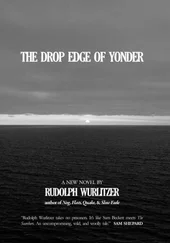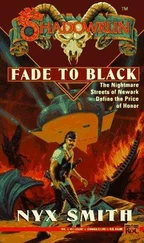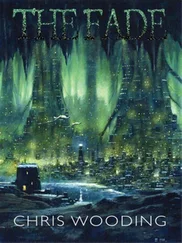Rudolph Wurlitzer - Slow Fade
Здесь есть возможность читать онлайн «Rudolph Wurlitzer - Slow Fade» весь текст электронной книги совершенно бесплатно (целиком полную версию без сокращений). В некоторых случаях можно слушать аудио, скачать через торрент в формате fb2 и присутствует краткое содержание. Год выпуска: 2011, Издательство: Drag City, Жанр: Современная проза, на английском языке. Описание произведения, (предисловие) а так же отзывы посетителей доступны на портале библиотеки ЛибКат.
- Название:Slow Fade
- Автор:
- Издательство:Drag City
- Жанр:
- Год:2011
- ISBN:нет данных
- Рейтинг книги:5 / 5. Голосов: 1
-
Избранное:Добавить в избранное
- Отзывы:
-
Ваша оценка:
- 100
- 1
- 2
- 3
- 4
- 5
Slow Fade: краткое содержание, описание и аннотация
Предлагаем к чтению аннотацию, описание, краткое содержание или предисловие (зависит от того, что написал сам автор книги «Slow Fade»). Если вы не нашли необходимую информацию о книге — напишите в комментариях, мы постараемся отыскать её.
Slow Fade — читать онлайн бесплатно полную книгу (весь текст) целиком
Ниже представлен текст книги, разбитый по страницам. Система сохранения места последней прочитанной страницы, позволяет с удобством читать онлайн бесплатно книгу «Slow Fade», без необходимости каждый раз заново искать на чём Вы остановились. Поставьте закладку, и сможете в любой момент перейти на страницу, на которой закончили чтение.
Интервал:
Закладка:
“I suppose it was a little like that,” Walker said softly, not able really to remember. “More or less like that. . except there were the pleasures. . the terrifying pleasures, running from one to the other, and always money, piling up money, making deals, always that. . obsession with the next high roll. . manipulating.”
“Where would we cut to from the last scene?” A.D. asked, trying to push it along, resisting an impulse to let the stars devour him. “You remember that weird scene in the bedroom where they were in the middle of packing and going at each other, throwing things and screaming out all the hate and then that last roll on the rug. .?”
After a long moment where it appeared that he had dozed off, Walker began to get into it:
RIGHT — TO INDIA. . Lacey opening her eyes and staring at a large fan turning slowly above her. She would be lying on a single bed and you can tell by the vacant expression in her eyes that she has no idea where she is as we go with her point of view: wicker furniture, cool blue and white tiles on the floor, the chaos of their clothes and luggage spilled around the room as if caught in a violent wind, an empty gin bottle lying on the pillow. . She stands on the balcony in her dressing gown, looking down at an ivy-colored brick wall surrounding a controlled garden with flowers, peacocks, bowing waiters, and a highly theatrical show business yogi performing a series of flashy asanas for the hotel guests sitting at tables on the lawn, one of whom is her hung-over and bored husband. . Dismissing the predictable view beneath her, she gazes enamored at the street beyond the hotel enclave where two elephants pass like ponderous ships through a congested stream of people, cows, water buffaloes, taxis, buses. .
EXTERIOR — MIDDAY. . riding in a hand-drawn ricksha down a narrow side street. Jim is appalled and depressed at the poverty, while Lacey, surprisingly, has nothing but enthusiasm for the languid exotic atmosphere. Suddenly he lashes out at her, telling her to keep her banal responses to herself and not try to insist imperially that he see things her way and to leave him the fuck alone. In this alienated mood they arrive at a simple one-story house with a tin roof surrounded by palm trees. .
INTERIOR — HOUSE. . the melancholy sound of a vina and the tap-tap of a murdang, a long double drum. A dark-skinned woman in a maroon sari opens the door and they can see a large white room with a rug on the floor where an ancient white-bearded man in a starched dhoti interrupts the student playing the murdang and demonstrates how he wants the phrase played. He speaks in Tamil to one of the students, a handsome youth in his early twenties, but the young man, Samendra, is distracted by the appearance of the bizarre Westerners, in particular, Lacey. The teacher, Baba, takes a long stick with a black lacquer handle and whacks Samendra over the head, speaking to him reproachfully. Samendra bows, stands up, and walks over to Jim and Lacey. “Baba asks why you have interrupted the lesson?” Jim tells him the whole rap about Clementine and how they’re looking for her and how worried they are and Samendra says all this in Tamil to Baba and he gives a reply which Samendra translates: “Baba says music was not your sister’s true path. She was not a good student and Baba regrets having included her in his class.” Jim interrupts to ask if Clementine is okay, if she’s still alive, and Baba turns to him and states in highly theatrical Oxfordian English: “I do not care nor am I interested in what happened to your sister after she left my tutelage. Samendra will confess all he knows after his lesson is over. If you will excuse me, I am an old man and have no time for chatter.”. . He turns his back. Samendra manages to whisper that he will meet them on the beach. .
EXTERIOR. . They walk across the street to a wide spectacular beach facing the Bay of Bengal. It is hot and little waves of heat rise off the sand. In the distance, ebony-colored fishermen in loincloths pull their nets toward the shore. They are in the middle of an argument about why Jim didn’t insist on knowing if at least Clementine was alive. He refuses to go back, saying that the place gave him the creeps and it’s not going to make any difference anyway. She turns angrily away, only to fall back toward him, startled by a solitary figure staring at them with a coldly detached gaze not ten feet away. His naked body is covered with white ash and he holds a small three-pronged trident in his right hand. They have another argument about whether they should move down the beach and then. .
SAMENDRA ARRIVES. . Looking at the sadhu, he gives him a coin and claps his hands. The sadhu takes the coin but doesn’t walk away. “I could not leave,” Samendra says, sitting down opposite them on the sand. Anticipating Jim’s inevitable question, he says that as far as he knows Clementine is in New Delhi and that he can give them an address. It is obvious by the shy hesitant way he mentions Clementine’s name that he is strung out on her. “She was not a bad student but she had no real interest in music. She quite severely damaged her hand, you know.” They didn’t know. “Yes, yes,” he goes on rapidly. “She was in a taxi and there was a flat and as they were changing the tire the jack slipped. Her hand was on the ground and she just left it there for the car to crush. Quite amazing the way she left her hand there. I watched it myself.”. . They sit facing slightly different directions as if they had lost their connections with each other, the sadhu staring straight at them as before. . Jim asks: “What happened with her? I mean, I always knew she was using Indian music as a hustle to have an adventure, to break away for a while, but this is very extreme.”. . Samendra smiles at them. “Before the, ah, accident,” he says, averting his eyes and staring off at the sea, “your sister was visiting a man who sat with Ramana Maharsi, the enlightened being from Arunachala whose body has now left us. This man, Chandra Doss, who sat with Ramana Maharsi for six years, is not a swami or anything like that. He is a simple man who has a family and sells bidis, these little cigarettes, in the marketplace. You can see him there anytime. He makes all these bidis and he sells them. Your sister met him because that is where she bought her cigarettes and she began to talk with him. Everything was falling apart for her and she thought that she might have to return home and Chandra Doss told her that it was true that everything was falling apart and that it would get worse no matter what she did and that she should embrace that state rather than deny it; what Ramana Maharsi calls the Atma-Vichara, to inquire intensely after the self. And so she inquired intensely after her self because that was what she was doing anyway, although in a very ignorant way, and soon all she was left with was the chaos of her own thoughts. Then Chandra Doss told her to say neti neti, or, no, not those thoughts either, and that is where perhaps the real crises began because she could not accept the existence of the Aham-Brahman.” “The Aham-Brahman?” Lacey asks, bewildered by this explanation which has been spoken very fast, as if Samendra wants to get it all said so that he can just split. “Yes. Yes. The I. The absolute. The noise of her own mind brought a kind of madness upon her.”. .“You mean she flipped out?” Jim asks impatiently. Samendra appears pained, as if Jim is being purposely obtuse, which he no doubt is. But Samendra proceeds anyway. “One might say that your sister became gradually obsessed with the awareness that she was not her thoughts. I was a witness. I was there every day to watch. She would not talk to Baba about her music. She would not respond. She would not practice. Her whole life seemed to stop.”. .“What does that mean, she’s not her thoughts?” Jim asks, almost shouting. “Of course she’s her thoughts. Cogito ergo sum, baby.”. . Samendra stands up, frightened and embarrassed by the aggression in Jim’s eyes. He turns away as if he cannot bear it any more, then suddenly whirls around to face them. “Tat-tvam-asi,” he shouts, his face beaming as if he has remembered a magic formula. Sitting down, he smiles at them sweetly. “Tat-tvam-asi. Thou art that. That is what your sister began to meditate on. I remember that quite clearly. Of course I do not know what it all means because I am not sannyas. I am a musician. Perhaps you should ask Chandra Doss about the teaching of the great sage of Arunachala.”. .“She’s become some kind of freak,” Jim says quietly. They sit there silently until suddenly Samendra laughs and claps his hands. “You see, your sister discovered she could not control her thoughts for one second. That is something that we know here that you in the West are perhaps ignorant of.”. . Jim stands up to leave. “I don’t know how to deal with that. . No, no.” Samendra jumps up to stand beside him. “I seriously doubt whether you can stop your mind for one brief moment.”. .“Why should I stop my mind?” Jim asks. “I need all I can get out of it.”. .“I don’t think that’s an unreasonable request,” Lacey says. “After all, it’s what Clementine was obsessed by.”. .“I’m not in the mood for mystical parlor games,” Jim says, nodding to Samendra. “In any case, I appreciate all this information. At least we know she’s off on her own adventure and doesn’t need us showing up looking for her.”. . Confused and insulted, Samendra bows and walks across the beach to the house. . “I think we should still try to find her,” Lacey says on the way back to the hotel. “Obviously she’s in an extremely perilous place.”. .“Who isn’t in a perilous place?” Jim says. “Maybe she should find us.”. . They have a terrible fight on the street that ends with their walking off in separate directions. .
Читать дальшеИнтервал:
Закладка:
Похожие книги на «Slow Fade»
Представляем Вашему вниманию похожие книги на «Slow Fade» списком для выбора. Мы отобрали схожую по названию и смыслу литературу в надежде предоставить читателям больше вариантов отыскать новые, интересные, ещё непрочитанные произведения.
Обсуждение, отзывы о книге «Slow Fade» и просто собственные мнения читателей. Оставьте ваши комментарии, напишите, что Вы думаете о произведении, его смысле или главных героях. Укажите что конкретно понравилось, а что нет, и почему Вы так считаете.











